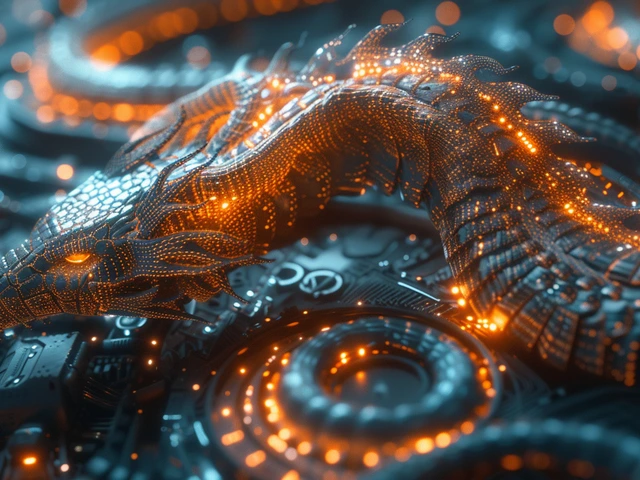Innovative Coding for AI: Shaping Tomorrow's Technology

Innovative Coding for AI: Shaping Tomorrow's Technology
Coding for AI isn't just about zeros and ones; it's about creating smart solutions that learn and adapt. As Artificial Intelligence continues to grow, it’s transforming the way we approach problems, offering limitless potential for innovation.
Understanding the basics of AI coding is crucial in this tech-driven world. By grasping core concepts like machine learning and neural networks, one can appreciate the incredible strides being made. Today, AI is being woven into our daily lives, from personal assistants like Bruno's favorite treat dispenser to advanced healthcare diagnostics.
Looking at current trends reveals fascinating progress in AI development. Technologies such as deep learning are making machines think more like humans, while natural language processing helps them understand and interact with us better. This fusion of AI with other cutting-edge technologies is paving the path for unprecedented innovations.
The future holds even more promise. Imagine AI-powered cities where every detail is optimized for efficiency, or agricultural systems that anticipate and counter environmental changes. The possibilities are endless, and the need for skilled AI coders is growing rapidly.
For those aspiring to jump into the AI coding arena, remember to stay curious and keep learning. Mastering a range of programming languages and understanding AI’s ethical implications will set the stage for becoming a part of this exciting journey. Innovation starts with a single line of code.
- The Basics of AI Coding
- Current Trends in AI Development
- Future Innovations in AI
- Tips for Aspiring AI Developers
The Basics of AI Coding
Diving into the realm of AI coding starts with understanding the essential concepts that power this vast field. At its core, Artificial Intelligence involves creating algorithms that allow computers to perform tasks that typically require human intelligence. These tasks might include recognizing patterns, making decisions, and even predicting future events.
One of the foundational concepts is machine learning. This is a subset of AI that focuses on building systems that can learn from data and improve over time. Think of it like teaching a German Shepherd, like Bruno, new tricks but with data. Machine Learning can be categorized into three types: supervised learning, unsupervised learning, and reinforcement learning. Each type has its method of training the model and applications.
A pivotal part of AI coding involves neural networks. These networks mimic the way the human brain operates by using interconnected nodes, or neurons. The magic happens through layers—input, hidden, and output layers—that process and refine information. Neural networks are the building blocks of deep learning, which is behind many breakthroughs in AI, from facial recognition to natural language processing.
"Artificial Intelligence is not about machines that think, but rather about machines that learn." - Patrick Winston
Understanding data is another essential aspect of AI coding. The phrase "garbage in, garbage out" is critical in this context. High-quality, relevant data is vital for training effective AI models. Data pre-processing techniques, such as normalization and transformation, are used to clean and prepare raw data. Once the data is ready, it’s fed into AI algorithms to train models.
Programming languages also play a significant role. Python is the most popular language for AI development due to its simplicity and powerful libraries like TensorFlow, PyTorch, and Scikit-Learn. R is another language favored for statistical analysis and visualization. These languages make it easier to implement complex algorithms and validate models.
Ethics in AI is increasingly significant. Ensuring that AI systems are designed and used responsibly is a growing concern. Bias in data, transparency of algorithms, and the potential societal impacts of AI are all factors that coders must consider. Developing ethical guidelines and frameworks helps in creating AI systems that are fair and just.
To summarize, mastering the basics of AI coding involves understanding machine learning, neural networks, data handling, and selecting the right programming language. Ethical considerations also play a crucial role. As the field continues to evolve, gaining a robust understanding of these basics will provide a solid foundation for diving deeper into the world of AI innovation.

Current Trends in AI Development
Artificial Intelligence has come a long way since its inception, and the current trends in AI development highlight several remarkable advancements and innovations. One of the most prominent trends is the rise of deep learning. This subset of machine learning allows computers to mimic the workings of the human brain in processing data and creating patterns for use in decision making. It's playing a vital role in image and speech recognition, autonomous driving, and more.
In recent years, the integration of natural language processing (NLP) has been nothing short of revolutionary. NLP enables machines to understand, interpret, and respond to human language in a valuable way. For instance, virtual assistants like Alexa and Siri, which you might use to turn off the lights or play your favorite song, are powered by NLP. This technology is also enhancing customer service through chatbots, which handle inquiries and provide solutions in real-time.
Another groundbreaking trend is the use of reinforcement learning in developing sophisticated AI systems. This approach allows AI to learn and make decisions through trial and error, much like how humans learn new skills. One fascinating application is in robotics, where robots are being trained to perform complex tasks through reinforcement learning.
The fusion of AI with Internet of Things (IoT) devices is also gaining momentum. As more devices become interconnected, AI is being leveraged to gather and analyze vast amounts of data, driving smarter decision-making processes. For example, IoT sensors in agriculture are helping farmers optimize water usage and predict crop yields more accurately, leading to more sustainable farming practices.
AI's impact isn't limited to just AI-native industries. Traditional sectors like finance and healthcare are experiencing significant transformations. Fintech companies are using AI to enhance fraud detection and personalize financial services. In healthcare, AI-driven tools are aiding in early diagnosis and treatment planning, improving patient outcomes. According to a study by Accenture, AI applications could potentially save the U.S. healthcare economy up to $150 billion annually by 2026.
"Artificial Intelligence and deep learning are transforming society and industry, with the ability to process, analyze, and derive insights from vast amounts of data," says Andrew Ng, a pioneer in the field of AI.While these advancements are promising, it's also essential to address the ethical considerations surrounding AI. Ensuring that AI systems operate transparently and without bias is a growing concern. Efforts are underway to develop frameworks and guidelines that promote the responsible use of AI.
Finally, the trend towards democratizing AI tools is noteworthy. With the availability of open-source libraries and platforms, more developers have access to AI technologies. This democratization is lowering the barriers for entry into the field, fostering innovation, and allowing individuals and small businesses to leverage AI's power in their own projects.
In sum, the current trends in AI development are shaping an exciting future. From deep learning and NLP to reinforcing learning, IoT integration, impact on traditional industries, addressing ethical concerns, and the democratization of tools—each trend highlights the transformative potential of AI. Keeping an eye on these trends is essential for anyone interested in the ever-evolving landscape of artificial intelligence.

Future Innovations in AI
The future of AI is nothing short of electrifying. Just imagine cities where every detail is optimized through AI. Traffic flows smoothly because smart systems communicate with vehicles and traffic lights. Energy grids efficiently distribute resources based on real-time usage data. These smart cities will be a hallmark of tomorrow's AI-driven innovations.
In healthcare, AI's potential is life-changing. Think about AI algorithms that predict outbreaks of diseases before they occur, allowing for preventive measures that save lives. Personalized medicine, where treatments are tailored to a patient’s genetic makeup, is becoming more common. AI-driven diagnostic tools have already started spotting ailments that doctors might miss, increasing the accuracy and speed of diagnoses.
Agriculture is another field set to benefit greatly from AI improvements. Farmers will use drones paired with AI to monitor crops and analyze soil. These smart systems will suggest ideal planting and harvesting times and optimize the use of fertilizers. Such technology could help solve global food shortages by maximizing efficiency and reducing waste. It's a remarkable step forward in ensuring food security.
Manufacturing is on the brink of a revolution with AI-powered robots. Factories are incorporating machines that can work tirelessly, learn from their tasks, and adapt to different processes without human intervention. This leap can massively boost productivity and allow for a shift towards more customized production. The implications for industries and economies are immense.
AI in education will transform how we learn. With personalized learning platforms that adapt to each student's needs, every learner can achieve their full potential. These systems can provide instant feedback and tailor educational content based on performance. It’s a shift that could democratize education, making it accessible and effective for everyone.
The World Economic Forum reports, 'By 2025, AI will create 97 million new jobs across 26 countries.' That’s a testament to the vast potential and need for skilled professionals in AI coding.
The entertainment industry won't be left behind. AI is set to craft personalized content, suggesting movies, music, and books based on intricate understanding of individual tastes. Interactive virtual reality experiences with AI-driven characters will blur the lines between the digital and physical worlds, offering immersive escapades like never before.
Moreover, environmental sustainability will see huge advancements. AI can help track wildlife populations, predict environmental changes, and suggest intervention strategies. We might witness substantial progress in tackling climate change and protecting biodiversity with these intelligent tools.
As AI integrates into various sectors, ethical considerations will become critical. Ensuring responsible AI development will be key to maintaining trust and safety. From establishing regulations to fostering transparency, these measures will shape how we embrace future innovations.
Embracing AI's future means stepping into a world of possibilities. The technology holds the power to redefine boundaries and solve complex challenges across diverse fields, marking a thrilling era of unprecedented growth and creativity. For those embarking on a career in AI coding today, the opportunities to make a profound impact are boundless and exhilarating.

Tips for Aspiring AI Developers
Diving into the world of AI development can be daunting but incredibly rewarding. The field is growing rapidly, and there are numerous pathways to start your journey. Firstly, it’s crucial to have a strong foundation in programming. Languages like Python and R are highly recommended because they offer powerful libraries and frameworks that simplify AI tasks. Many successful AI developers also delve into Java and C++, especially when performance is a priority.
Next, understanding basic concepts in mathematics and statistics is essential. Topics like linear algebra, calculus, and probability theory form the backbone of many machine learning algorithms. A plus is a solid knowledge base in data structures and algorithms, which are fundamental in writing efficient code. You can find many online courses and resources that break these concepts down into digestible sections.
Engaging with the AI community can accelerate your learning process. Platforms like GitHub, Kaggle, and Reddit are great places to start. Contributing to open-source projects or participating in competitions can provide practical experience and valuable feedback. Additionally, joining local meetups or online forums can help you connect with like-minded individuals who can offer advice and support.
Practicing problem-solving with real-world data is crucial. Start small by working on personal projects or contributing to challenges that interest you. This hands-on experience will help you understand the process of cleaning data, selecting algorithms, and tuning models. Don't shy away from experimenting and learning from your mistakes, as these experiences will build your confidence and skills.
Investing time in learning about the ethical implications of AI is also important. AI is a powerful tool that can significantly impact society, so it’s crucial to develop and use it responsibly. Understand issues such as data privacy, bias in algorithms, and the potential for misuse. Adhering to ethical practices ensures that your work contributes positively to society.
Many experts emphasize the importance of continuous learning. AI is a rapidly evolving field, and staying up to date with the latest research and advancements is vital. Subscribing to reputable journals, attending conferences, and taking advanced courses can keep you on the cutting edge. As Andrew Ng, a prominent AI researcher, once said,
"AI is the new electricity. Just as electricity transformed numerous industries a century ago, AI will do the same today."
In summary, breaking into AI development requires a blend of strong foundational knowledge, continuous practice, community engagement, and a commitment to ethical practices. With dedication and an insatiable curiosity, you'll be well on your way to contributing to the exciting future of AI technology.
About
CH Tech Development is a premier resource for the latest updates and insights in the world of technology development. We provide extensive information, articles, and guides on cutting-edge technological advancements. Explore our site to empower your knowledge about the dynamic field of tech development.
Latest Posts


The Best Python Tricks for Beginner Programmers
By Silas Hawthorne Jul 31, 2023

Leveraging AI for Predictive Analysis: Revolutionizing Insights
By Ramona Bingley Jun 20, 2024

Python for AI: The Future Starts Here
By Silas Hawthorne Jul 30, 2023

Write a comment